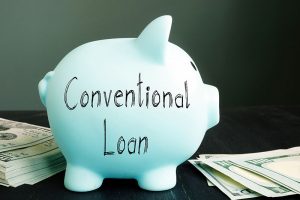8 Crucial Tips for First-Time Home Buyers Considering Mortgage Refinance in Raleigh Navigating the…
What Is a Conventional Loan?

What Is a Conventional Loan? Benefits, Requirements, and More
When you’re in the market to buy a home, securing a mortgage is an essential step that can feel overwhelming with so many options available. At Certified Home Loans in North Carolina, we understand the challenges and are here to simplify the process for you. In this comprehensive guide, we’ll delve into conventional loans, highlighting their benefits, requirements, and how they compare to other mortgage options, so you can make an informed decision with confidence.
Understanding Conventional Loans
A Conventional Loan is a mortgage not backed by any government agency. Unlike FHA, VA, or USDA loans, the government does not guarantee the repayment of these loans if the borrower defaults. Instead, private lending institutions such as banks and credit unions issue and insure these loans.
Conventional Loans are categorized into two main types: Conforming and Non-Conforming.
- Conforming Loans: These loans adhere to the loan amount limits set by the Federal Housing Finance Agency (FHFA) and meet the underwriting guidelines of Fannie Mae and Freddie Mac. The maximum loan limit for 2024 is $766,550 in most parts of the U.S.
- Non-Conforming Loans: These loans do not meet FHFA, Fannie Mae, or Freddie Mac guidelines. The most common type of non-conforming loan is a Jumbo Mortgage, used for loan amounts exceeding the conforming limits.
Types of Conventional Loans
- Fixed-Rate Mortgage:
– The most popular type of Conventional mortgage.
– Features a fixed interest rate for the entire loan term, providing stability in monthly payments.
– Common terms include 10, 15, 20, and 30 years. (Custom Flex-Terms are also available.)
- Adjustable-Rate Mortgage (ARM):
– Offers an interest rate that changes over time.
– Typically begins with a lower fixed rate for an initial period (3 to 10 years), followed by adjustments b
Requirements for Conventional Loans
Each lender may have slightly different requirements, but the general prerequisites include:
- Credit Score:
– A minimum credit score of 620 is typically required.
– Higher scores can lead to better terms and lower interest rates.
- Down Payment:
– As low as 3% for some borrowers.
– Jumbo Loans require at least 5%.
– A down payment of less than 20% necessitates private mortgage insurance (PMI).
- Private Mortgage Insurance (PMI):
– Protects the lender in case of default.
– Required if the down payment is less than 20%.
– The cost varies and is usually included in the monthly mortgage payment.
– PMI can be removed once the borrower has paid off more than 20% of the loan balance.
- Debt-to-Income Ratio (DTI):
– Compares monthly debt payments to pre-tax income.
– Typically, a DTI of 45% or less is required, though some lenders may allow up to 50%.
– A favorable DTI is around 36%.
- Loan Limits:
– Conforming loan limits for 2024 are $766,550 in most areas and $1,149,825 in high-cost areas.
Benefits and Drawbacks of Conventional Loans
Advantages:
- Flexible Loan Terms:
– Available in various terms, offering flexibility to match the borrower’s financial situation.
- No Upfront Mortgage Insurance Premium (MIP):
– Unlike FHA loans, conventional loans do not require an upfront MIP.
- Higher Loan Limits:
– Higher borrowing limits compared to government-backed loans, making them suitable for more expensive properties.
Disadvantages:
- Stricter Qualification Criteria:
– Higher credit score and lower DTI requirements compared to FHA loans.
- Higher Down Payments for Some Borrowers:
– Jumbo and Portfolio Loans may require substantial down payments.
- Potentially Higher Interest Rates:
– Particularly for subprime and portfolio loans, which carry higher risk.
Comparing Conventional Loans with Other Loan Types
Conventional Loan vs. FHA Loan:
- Credit Score: FHA loans are more lenient, allowing scores as low as 500.
- Down Payment: FHA requires as little as 3.5% down for scores above 580, and 10% for scores between 500-579.
- DTI: FHA loans are more flexible with a maximum allowed DTI of 57%.
- Property Type: FHA loans are only for primary residences, while conventional loans can be used for second homes and investment properties.
- Additional Fees: FHA loans require MIP, which never drops off, unlike PMI for conventional loans.
Conventional Loan vs. VA Loan:
- Eligibility: VA loans are available only to military members, veterans, and their families.
- Down Payment: VA loans do not require a down payment, whereas conventional loans require at least 3%.
- PMI: VA loans do not require PMI, while conventional loans do if the down payment is less than 20%.
- Interest Rates: VA loans often have lower interest rates.
Conventional Loan vs. USDA Loan:
- Property Type: USDA loans are restricted to primary residences in rural areas.
- Income Limits: USDA loans have income caps based on location and household size.
- Down Payment: USDA loans require no down payment.
- PMI: USDA loans do not require PMI.
- Interest Rates: USDA loans often have favorable interest rates.
How to Qualify for a Conventional Loan
To qualify for a conventional loan, you need to prepare and provide several documents and meet certain criteria:
- Gather Documents:
- Identification: Driver’s license, passport, or government-issued ID.
- Proof of Income: Recent pay stubs, W-2 forms, and tax returns.
- Asset Documentation: Statements from savings, checking, and investment accounts.
- Debt Information: Details on existing debts such as loans and credit cards.
- Build Your Credit Score:
- Pay down existing debts.
- Dispute any errors on your credit report.
- Ensure timely payments on all bills.
- Avoid opening new lines of credit.
- Request credit limit increases if possible.
- Stable Employment and Income:
- Consistent income over at least two years.
- Documentation of salary, bonuses, commissions, and other income sources.
Frequently Asked Questions
- What does a Conventional Loan mean?
– A Conventional Loan is a mortgage not backed by a government agency, issued by private lenders.
- Is a Conventional Loan good or bad?
– It is typically favorable for those with good credit and a stable income, offering flexibility and potential cost savings.
- Which is better, an FHA or a Conventional Loan?
– It depends on your financial situation. Conventional loans are better for those with higher credit scores and larger down payments. FHA loans are suitable for those with lower credit scores.
- Why would someone only take a Conventional Loan?
– Conventional Loans can offer lower down payments, no MIP, and the ability to finance second homes or investment properties.
Conclusion
Securing the right mortgage is a pivotal step in the journey to homeownership, and navigating the complexities of conventional loans can be challenging. At Certified Home Loans, we pride ourselves on providing expert guidance tailored to your unique financial situation. Whether you’re a first-time homebuyer or looking to refinance, our team of experienced mortgage specialists in North Carolina is here to assist you every step of the way. Reach out to Certified Home Loans today and let us help you achieve your homeownership dreams with confidence and ease. Call us today: 919-510-1108





